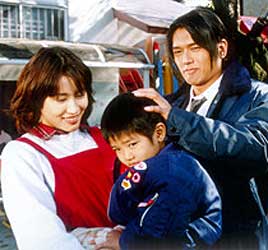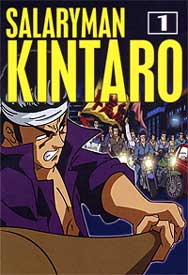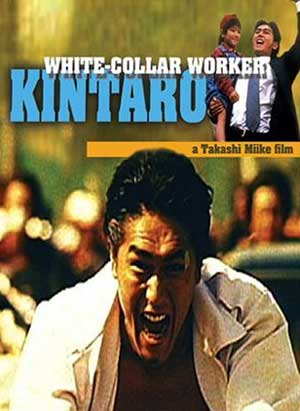This film was variously marketed in English as Kintaro: White Collar Worker or White Collar Worker Kintaro or Salaryman Kintaro, this last the literal translation of the Japanese title of the live action movie, the television series, & the anime cartoon series about the same character, based on the manga or comic book character created by Hiroshi Motomiya.
The word "Salaryman" sounds like a literal translation of some quaint Japanese word since it isn't used of western office workers, but oddly enough Salaryman provided the English borrowing for the Japanese word "Sarariman" which is mangled English, indicating what we would be more apt to call a "Wage Slave," with emphasis on Slave.
This is one of the Takashi Miike's lesser films. He likes to think of himself as of limitless scope making all genres, but he really only makes three kinds of films: Films that are brilliant (Rainy Dog, Visitor Q, The Bird People in China) whether or not shocking (Ichi the Killer); films that are mediocre where or not ordinary, & films that are completely pieces of crap (Andromeda, MPD Psycho). Saririman Kintaro is in the mediocrity cluster.
He made seven films in 1999 & neglected to waste even so little as one-seventh of a portion of his talent on this one. Though competent as drivel goes, it is nothing special, though with a couple rewrites of the script it might've been something more. It's first problem is it pummels its "message" on the viewer. It's a message that resonates in wage-enslaved Japan, & which might've been powerful if the script didn't spell it all out in didactic dialogue rendering it trite.
Kintaro (Tsutomo Yamazaki) is a young, attractive "salary man" at a construction company reliant on public works. In an opening scene he stops teen thugs from beating & robbing another polyester suit & tie man in the street. "We despise you salary men!" says one juvenile delinquent, & they all jump Kintaro together. He beats them all up in a jiffy, straightens his tie, & says, "Don't despise salary men!" as he walks off to work.
Not until the deux ex machina ending will we be provided with even a clue as to how Kintaro acquired his fighting skills & "chivalrous yakuza" demeanor, although in Japan Kintaro is sufficiently iconic that most viewers would already know the likely background of such a character. The film never tells us a lot of what we need to know; he's a father, for instance, but we don't know why there is no mother in the picture. From the comic book or the anime series we'd know his wife's dying wish (before any Kintaro story started) was that he leave behind his life as a motorcycle hoodlum, but in the live action movie we are given no reason for him being either a father or a salaryman.
The box the DVD came in tried to make more sense of the character than the film does, claiming it was about a "mobster" who "tries to go legit" but his past catches up with him. That's not even close to what the story is about. Kintaro was never a mobster or yakuza (he was a bosozoku or biker), & he is not haunted by a past but troubled by injustices perpetrated against his company. As a heroic company man, he can't let his company go down in flames without a fight.
The Yamato Construction Company loses all its public works contracts one by one. The kindly-old-Gepetto type company president wonders who his enemy is & why there are machinations to bring his company down. As it happens, a rival comany with a never-explained grudge has paid off a Senator who is eager to help the rival completley destroy the Yamato Company, because the Senator was already peeved with Kintaro who interferred with the Senator's attempt to take a nice young woman as his personal whore.
The film drags on & on until eventually the unfairness of rigged bidding, & threats & injuries to Kintaro's boss & family, means he must go on a raid of the enemy headquarters then of the senator's office.
Kintaro decides to call in a favor. He calls an old friend from his days in a motorcycle gang & asks him to get the cyclists together. Bare in mind we never know until that moment that Kintaro even knows how to ride a motorcycle, let alone was once the leader of an outlaw gang, so this is pretty bad screenwriting, & depends on the audience already knowing who Kintaro is from the comic book version. But what the hell, it may be stupid, but at least something's going to happen at long last, right? Wrong.
We get to see Kintaro put on a cool white Japanese gangbanger equivalent of an ugly-ass ice cream suit & ride into town at the head of a huge parade of motorcyclists. But as soon as they all get to the edge of town & see the police blocades, the motorcycle gang is hastily written out of the story (we're never even shown where so many bikers could've vanished to so suddenly) & Kintaro continues to his destination with only one friend in tow, a guy we never learn anything about so his presence is meaningless, just as calling the motorcycle gang together in the first place had been pointless.
Anyone familiar with Miike's over-the-top violent films may be sticking it out with this boring film mainly waiting to get to a violent conclusion, but there is none. The raid on his enemies' headquarters has some minor fisticuffs & batting at each other with pipes or bokkens or stabbing feebly with knives, with a threat of a beheading with the only sword barely used, but so little happens that no one'll even need a doctor afterward. Kintaro's friend on the raid just sort of vanishes with no contributory scene, & Kintaro heads off for the final confrontation with the real enemy, the Senator. But he gets arrested by riot control police before he even gets inside, so there is no climax to the film.
The action is underplayed apparently for the sake of pseudo-realism since Kintaro is an idealized portrait of Japan's real overworked dutiful salary men, maltreated, disrespected, underestimated, but always faithful like brave obedient dogs.
 Cut to courtroom decision, Kintaro getting one year's probation, so in essence not in trouble for his rather mild antics. Cut to Senator getting arrested (B.F.D.) for accepting bribes from the bad construction company. Cut to Kintaro greeted outside the courtroom by hordes of Japanese people who now idolize him. Then his company's president, the kindly-old-Gepetto, repeats a previous speech he already gave, just in case we didn't get the "message" the first time it was over-stated: "Japanese people are angry. The people admire you for your boldness." Then the bubblegummy pop soundtrack gets more annoying than ever & a really bad song is sung behind the credits. Cut to courtroom decision, Kintaro getting one year's probation, so in essence not in trouble for his rather mild antics. Cut to Senator getting arrested (B.F.D.) for accepting bribes from the bad construction company. Cut to Kintaro greeted outside the courtroom by hordes of Japanese people who now idolize him. Then his company's president, the kindly-old-Gepetto, repeats a previous speech he already gave, just in case we didn't get the "message" the first time it was over-stated: "Japanese people are angry. The people admire you for your boldness." Then the bubblegummy pop soundtrack gets more annoying than ever & a really bad song is sung behind the credits.
This gutless picture was directed as a "family film" for unhappy salary men & their sons, so that guys who don't ordinarily have time for movies can for a little while try to relate to someone who is handsomer than they are, braver than they are, stronger than they are, no less slavish than they are, & not apt to step too far outside socially accepted norms even while pretending to be some kind of gangbanger knight in shining armor. The simpleminded theme is spelled out for retards & the mild violence is afraid of being scary. A critic who compared Kintaro to Walter Mitty was unfortunately dead-on. Walter Mitty was a hero only in his imagination, an office schlub who daydreams himself into fantastic adventures while his actual life remains crap.
 The film is awkwardly written, competently but not excellently performed, & though setting up our heroic Salary Man as the equivalent of a brave samurai or chivalrous yakuza, he doesn't actually sacrifice anything & utterly fails at vengeance. So despite the film's whining protest about disrespecting salary men, Kintaro as portrayed in this particular film is a debarked dog with his canines excised who postures well but that's all. If he's the idealized salary man, no wonder they get no respect. The film is awkwardly written, competently but not excellently performed, & though setting up our heroic Salary Man as the equivalent of a brave samurai or chivalrous yakuza, he doesn't actually sacrifice anything & utterly fails at vengeance. So despite the film's whining protest about disrespecting salary men, Kintaro as portrayed in this particular film is a debarked dog with his canines excised who postures well but that's all. If he's the idealized salary man, no wonder they get no respect.
 In case a viewer didn't feel sufficiently punished & wanted to see more of Kintaro, a television series picks up Kintaro's adventures, with Takahashi Katsunori (shown in the in-text photo above) starring as the motor cycle gangbanger turned tepidly womanizing violent businessman. In case a viewer didn't feel sufficiently punished & wanted to see more of Kintaro, a television series picks up Kintaro's adventures, with Takahashi Katsunori (shown in the in-text photo above) starring as the motor cycle gangbanger turned tepidly womanizing violent businessman.
Although it may be hard to track down, the whole series has been available with English subtitles on discs with ten to twelve episodes per disc: Sarariman Kintaro 1 (1999), Sarariman Kintaro 2 (2000), Saririman Kintaro 3 (2002), & Sarariman Kintaro 4 (2004)
Also available with English subtitles is the anime version with twenty or more episodes in 2001 likewise titled Saririman Kintaro with four episodes on each of the first two DVD disc releases in 2005, with further episodes doubtless forthcoming.
This last is occasionally falsely advertised as by Takashi Miike since his name sells. If not for the occasional outbursts of graphically drawn violence, the anime series would definitely be kids' stuff rather than mature anime, having simpleminded plots & moral lessons. The best that can be said for the cartoons is they're not as bad as Miike's live action movie.
If the viewer still isn't satiated, then there's the original illustrated book version (not translated), & even video & Playstation Kintaro games. Kintaro is even a spokesman in television advertisements, for this lame character really hit a note for the pitiful salaryman class, who'd frankly rather be cartoon characters than than live the lives they're stuck with.
copyright © by Paghat the Ratgirl
|

 Cut to courtroom decision, Kintaro getting one year's probation, so in essence not in trouble for his rather mild antics. Cut to Senator getting arrested (B.F.D.) for accepting bribes from the bad construction company. Cut to Kintaro greeted outside the courtroom by hordes of Japanese people who now idolize him. Then his company's president, the kindly-old-Gepetto, repeats a previous speech he already gave, just in case we didn't get the "message" the first time it was over-stated: "Japanese people are angry. The people admire you for your boldness." Then the bubblegummy pop soundtrack gets more annoying than ever & a really bad song is sung behind the credits.
Cut to courtroom decision, Kintaro getting one year's probation, so in essence not in trouble for his rather mild antics. Cut to Senator getting arrested (B.F.D.) for accepting bribes from the bad construction company. Cut to Kintaro greeted outside the courtroom by hordes of Japanese people who now idolize him. Then his company's president, the kindly-old-Gepetto, repeats a previous speech he already gave, just in case we didn't get the "message" the first time it was over-stated: "Japanese people are angry. The people admire you for your boldness." Then the bubblegummy pop soundtrack gets more annoying than ever & a really bad song is sung behind the credits. The film is awkwardly written, competently but not excellently performed, & though setting up our heroic Salary Man as the equivalent of a brave samurai or chivalrous yakuza, he doesn't actually sacrifice anything & utterly fails at vengeance. So despite the film's whining protest about disrespecting salary men, Kintaro as portrayed in this particular film is a debarked dog with his canines excised who postures well but that's all. If he's the idealized salary man, no wonder they get no respect.
The film is awkwardly written, competently but not excellently performed, & though setting up our heroic Salary Man as the equivalent of a brave samurai or chivalrous yakuza, he doesn't actually sacrifice anything & utterly fails at vengeance. So despite the film's whining protest about disrespecting salary men, Kintaro as portrayed in this particular film is a debarked dog with his canines excised who postures well but that's all. If he's the idealized salary man, no wonder they get no respect.